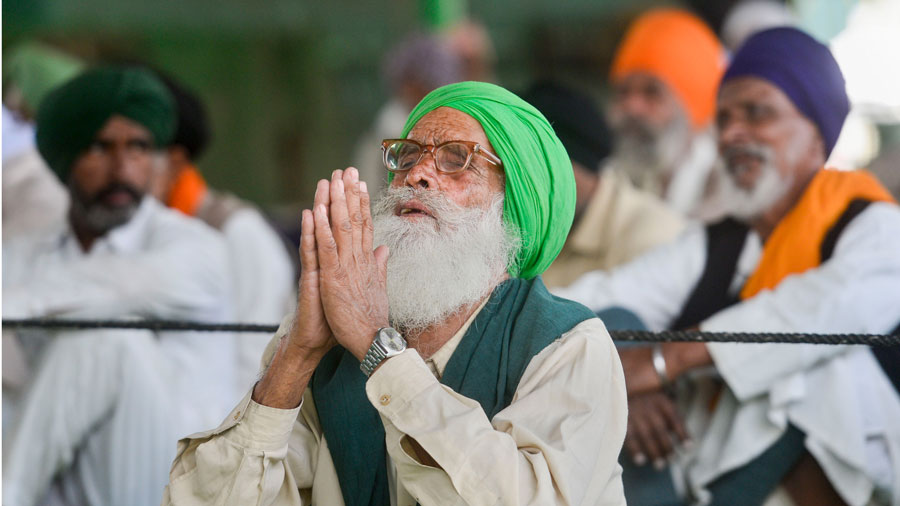Over the past year, Bengal has lent active support to the farmers’ movement at the gates of Delhi and amid the jubilation on Friday at the promise of a repeal of the contentious farm laws, many spoke about lessons from the protesters’ resilience.
Representatives from Kolkata’s Sikh community made multiple trips to the protest sites. Teams of doctors from the state organised free camps at Singhu and Tikri borders.
The Telegraph spoke with several persons involved in the movement and looking back at the year that went by, they pointed to some key lessons from the movement
Unbreakable spirit
“Atoot hausla (unbreakable resolve),” was how Manpreet Singh Monu, who has visited the protest sites in Delhi multiple times, described the farmers. If he saw first-hand how the farmers braved the capital’s cruel winter, his last visit in mid-September showed the farmers braving heavy rain.
“It was impossible to step out in the open. Water was seeping into the stock of dry rations,” said Monu, who owns a car rental business.
Mridul Sarkar, a Kolkata doctor and part of a non-profit called Medical Service Centre, spent weeks at the Singhu border to provide medical aid to the protesters. He said he was stunned by the farmers’ ability to endure pain. A member of his team had asked an elderly protester how long he would be able to continue the vigil. The farmer held out his right palm.
“This hand has steered tractors for decades. Don’t underestimate it. We are here for the long haul,” Sarkar heard him say.
“The protesters were informed and aware. At every corner, you would find someone reading a book,” he said.
Non-violence
Peace triumphs. Despite relentless pressure from the Narendra Modi regime, the farmers ensured that the protest was peaceful, said their well-wishers.
Avtar Singh, the general-secretary of Gurdwara Sant Kutiya on Harish Mukherjee Road in south Kolkata, said the peaceful nature of the movement would be its lasting legacy. “The farmers showed that Mahatma Gandhi’s values were still relevant,” he said.
Ranjit Singh, part of a group of Kolkatans who had driven to Delhi to participate in the Kisan Parade on Republic Day, remembered how Delhi police had set up “selective barricades” on the designated routes to “divert” marchers towards the Red Fort.
“The government wanted people to march towards the Red Fort so that they could be called anarchists,” he said.
Not afraid of labels
Terrorists, anti-nationals, Maoists, people pretending to be farmers: labels were pasted one after the other on the protesting farmers. The name-calling did not deter them.
“Modi’s Friday speech proved that the protesters were Indians. His apology showed that the protesters were sons and daughters of this very soil,” said Nausheen Baba Khan, who organised a long-standing protest against the farm laws at the Chakraberia Road-Sarat Bose Road intersection.
“He should also apologise for attempts to brand dissenters as anti-nationals.”
Pritpal Singh, the president of the Gurdwara Sikh Sangat in Barrackpore, lauded how the farmers defeated the smear campaign. “The message is clear — you cannot get away with putting labels on people who oppose your views,” he said.
Two states
Every time a team from Bengal went to the protest sites in the capital, they got the warmest of welcomes. A shared history of sacrifices binds Punjab — from where a majority of the protesters came — and Bengal, said many of them.
Sarkar, the doctor, recalled how Samayukta Kisan Morcha leaders welcomed his team.
“Bengal and Punjab have been the cradle of revolutionaries, having contributed most in India’s freedom struggle. It is but natural that these two places will offer the best resistance to oppressors,” he heard from more than one leader.
In the run-up to the Bengal polls, several leaders from the Morcha visited Bengal to campaign against the BJP. The crushing defeat the state inflicted upon the BJP was a shot in the arm of protesters at the borders of the capital, they said.
